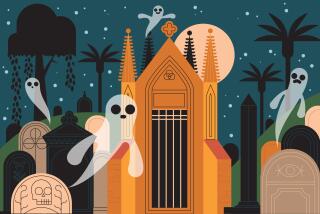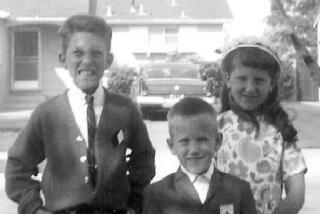OLD-HOME WEEK : Visiting a Former Haunt, He’s Confronted by Ghosts of the Past
It is slouching toward twilight, and the heat has started to break. I crouch on the floor of my old bedroom, face gritty with dust, trying to make sense out of what used to be my life. Outside, a paleta cart rolls past with a jangling flourish of sleigh bells. Through the window drift the mingled cooking odors of the neighborhood: the carne asada , the kebabs, the pungent Korean casseroles that I have not really smelled like this in the evening since I moved from here a couple of years ago.
A friend looks though a mountain of yellowed alternative papers in one corner, trying to find a picture of the new-wave band he used to play in back in the days when he still had all his hair. Another friend reaches for a rack and begins pulling off tiki shirt after tiki shirt--the vivid psychedelic kind printed on heavy cotton crepe; he folds them and stuffs them into Hefty bags.
By the far wall are records, thousands of them, mostly featuring musicians whose names I no longer recognize. In the closet are yards of thrift-shop sharkskin, stretched-out mohair sweaters and pointy shoes. And there is Maurice White’s shell-encrusted stage wardrobe from some decades-old Earth, Wind & Fire tour; it seemed important to acquire at one time, although I no longer remember why.
My wife leafs through a sheaf of ancient love letters from old girlfriends and a small stack containing photos of me as a naked performance artist that I thought had been destroyed for good. It is faintly galling that she is more amused than upset.
Here are programs from the Olympic Arts Festival--my coccyx has only just recovered from the eight-hour Mahabarata--and complete runs of the short-lived magazines Wigwag, 7 Days and Search & Destroy. There are snapshots of my wife as a baton twirler at St. Paul High School and a small collection of postcards showing a view of the snow-covered San Gabriel Mountains framed with orange-tree foliage.
It is a strange thing, to confront the detritus of one’s 20s, a time when it’s easy to try on one life after another so rapidly that it’s hard to remember exactly which identities were cast away in the process. Packing boxes, I am surrounded with law-school applications, tasteful red-silk ties and the cello part to Franck’s Symphony in D minor. There are sketches for a bad string quartet, some poorly executed resin sculpture and the first three chapters of a lousy novel. A largish envelope contains paperwork for the Foreign Service exam, which I did OK on, and the National Security Agency test, which I flunked. For reasons that escape me now, I once yearned to be a bureaucrat.
I lived in this apartment through most of my 20s and beyond, from the beginning of the first Reagan recession to the failure of Clinton’s health-care plan, and after that I used to come here in the mornings and write at a desk in this dusty little room so filled with my stuff. My friend Jac took over the rest of the place after his own apartment burned in an electrical fire, and he stayed until he died in an automobile accident a year to the day after he moved in. We disposed of his stuff, his family and friends, but afterward it was difficult to spend much time in this place, still alive with the scent of Jac’s unwashed laundry, the breakfast dishes moldering in the sink, the unrealized dreams--his and mine both--still hanging heavy in the air. Until it seemed ridiculous to continue, I came by each month to pay the rent, nod to the guys across the street and slump down with a magazine in my rust-colored Naugahyde chair.
From outside comes the delighted shrieking of the little girl next door, who only so recently had padded around the neighborhood in shoes designed to squeak loudly at every step. From the apartment downstairs came the tiny infant cry of a beautiful newborn boy named Ramon, whose family has been in this place even longer than I have. This month, they, too, are boxing up their belongings and escaping across town.
This place still feels like home, but tomorrow I won’t even have a key.



